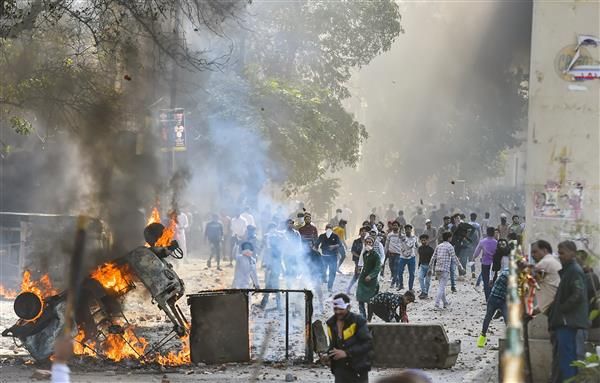
Photo for representational purpose only.
New Delhi, January 31
The Supreme Court on Tuesday expressed strong displeasure over the Delhi Police seeking adjournment of hearing on pleas against the bail granted to three student activists in the 2020 North East Delhi riots case on the ground that a senior law officer representing them was busy in another court.
A bench of Justice S K Kaul and Justice A S Oka observed that Solicitor General Tushar Mehta may be busy in several matters, but some alternative arrangements have to be made so that the matter could be heard.
“...if no alternative arrangement is made, we will presume that the government has nothing to say in the matter,” the bench said while posting the matter for hearing on February 21.
When the pleas had come up for hearing before the apex court on January 17, a deferment was sought by the police stating that Mehta, who is representing the state in the matter, was before a constitution bench.
The bench had then posted the matter for hearing on Tuesday, saying, “It is made clear that if alternative arrangements have to be made by the government, they may do so for the next date of hearing.” When the matter was first called for hearing on Tuesday, it was passed over as the solicitor general was not present in the court.
Later, when the matter was again taken up, advocate Rajat Nair, appearing for the police, requested the bench to post the matter for hearing next week, saying the solicitor general was present in the court, but he had to rush to another court for another matter which was being heard by a constitution bench.
“We are supposed to be sitting here.... somebody else should come. The solicitor general may be required in several matters,” the bench observed and referred to its last order.
While hearing the matter on January 17, the top court had observed, “We do not believe in unnecessarily keeping people behind the bars.” The apex court was hearing the pleas filed by the police challenging the Delhi High Court’s June 15, 2021 verdicts granting bail to activists Natasha Narwal, Devangana Kalita and Asif Iqbal Tanha in the case related to communal violence during the protests against the Citizenship (Amendment) Act (CAA).
During the hearing in the matter in July 2021, the apex court had indicated its reluctance to consider the aspect of cancellation of bail granted to the three activists, who were booked under the provisions of the stringent anti-terror law—the Unlawful Activities (Prevention) Act (UAPA).
It had termed as troubling that the bail petitions were being argued at length debating the provisions of the law.
The top court had earlier expressed its displeasure over the high court discussing the entire anti-terror law UAPA in a bail matter and made it clear that the judgements shall not be treated as a precedent and may not be relied upon by any of the parties in any of the proceedings.
The court, which had agreed to hear the appeals filed by police and issued notices to the three, had refused to stay the high court verdicts.
It had also clarified that the release of the three activists on bail was not being interfered with at this stage.
Earlier, Mehta had argued that 53 people had died and over 700 were injured during the riots which took place at a time when the then US president Donald Trump and other dignitaries were in the national capital.
The high court had said although the definition of a ‘terrorist act’ in section 15 of the UAPA is “wide and somewhat vague”, it must partake the essential character of terrorism and that the phrase ‘terrorist act’ cannot be permitted to be applied in a “cavalier manner” to criminal acts that squarely fall under the purview of the Indian Penal Code.
The Delhi Police had assailed the HC verdicts, saying the interpretation by the high court will weaken the prosecution in terror cases.
The high court had granted them bail, saying in an anxiety to suppress dissent, the State has blurred the line between the right to protest and terrorist activity, and if such a mindset gains traction, it would be a “sad day for democracy”.
Kalita, Narwal and Tanha are accused in four, three and two cases, respectively, related to the communal riots that broke out on February 24, 2020.
Join Whatsapp Channel of The Tribune for latest updates.



























